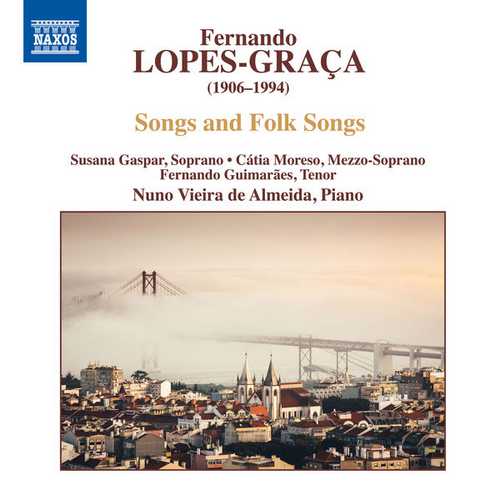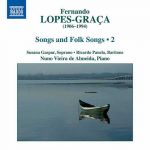
Composer: Fernando Lopes-Graça
Performer: Susana Gaspar, Nuno Vieira de Almeida, Cátia Moreso, Fernando Guimarães
Format: FLAC (tracks)
Label: Naxos
Release: 2018
Size: 1.32 GB
Recovery: +3%
Scan: yes
Cantos do Natal (4), Op. 97
01. No. 1, Ó Meu Menino Jesus
02. No. 2, Vinde Pastores
03. No. 3, Estando a Virgem
04. No. 4, Ó Meu Menino Tão Lindo
Poemas (3) de Adolfo Casais Monteiro, Op. 12
05. No. 1, Música
06. No. 2, Poemas das Mãos Tombadas
07. No. 3, Marcha Triunfal
Canções (10) Populares Húngaras, Op. 87
08. No. 1, Kertünk alatt
09. No. 2, Jeruzsálem kapujában
10. No. 3, Tegnap jártam zabaratni
11. No. 4, A gyirmóti magas torony
12. No. 5, Ideki a Csengébe
13. No. 6, Estefelé
14. No. 7, Látodé te azt a hegyet
15. No. 8, Jaj de porzik a zilahi
16. No. 9, Tedd be, vedd fö
17. No. 10, Öszi szél
Romances (2) de Armindo Rodrigues, Op. 47
18. No. 1, Romance das Três Meninas no Laranjal
19. No. 2, Romance dos Sete Cavaleiros
Chansons populaires russes (9), Op. 66
20. No. 1, Moissonneur!
21. No. 2, La mal-mariée
22. No. 3, Je m’en irai
23. No. 4, Sur la rivière
24. No. 5, Poussière de neige
25. No. 6, Pétrouchka
26. No. 7, Souliko
27. No. 8, Ma petite maisonnette
28. No. 9, Sur les flots puissants du Volga
As 3 Canções de Olívia, Op. 20
29. No. 1, Desalento
30. No. 2, O Bordado
31. No. 3, Distância
Novos Cantos (4) do Natal
32. No. 1, Em Belém
33. No. 2, Dia de Festa
34. No. 3, Cantiga à Virgem
35. No. 4, Vós Sois Cristo
There aren’t that many Portuguese composers on the discographic scene (or the musical scene, full stop): so we should doff our caps for this release of melodies by Fernando Lopes-Graça (1906-1994). A follower of Freitas-Branco in Portugal and then of Koechlin in Paris, he concentrated on the Portuguese folk repertoire, which, while clearly Iberian, differed radically from that of neighbouring Spain. In 1966, he was commissioned by Rostropovitch to write a Cello Concerto, which put him on the musical map of his times. This album offers a broad sample of his melodies, not all of which are Portuguese in inspiration: the Tíz Magyar Népdal (“Ten Magyar Songs”) of 1954 are testimony to his obvious admiration for Bartók’s work with folk music. And like Bartók, Lopes-Graça was able to take up folk themes and add to them a very elaborate and modern harmonisation, which would often push at the limits of tonality. But whereas the Magyar songs are indeed sung in Hungarian, Nine Russian Folk Songs are sung… in French! The other works, written between 1935 and 1958, cover a broader range of Portuguese heritage, whether religious (Quatre novis cantos do Natal, or “Four new Christmas songs”) or more worldly, like some based on classic poetry. Because, from Camõens to Pessoa, via Drummond de Andrade or Guimaraens, Portuguese is first and foremost a language for great poetry. The three soloists: soprano Susana Gaspar, mezzo-soprano Cátia Moreso, tenor Fernando Guimarães, accompanied on the piano by Nuno Vieira de Almeida, share greedily in the melodies.
Fernando Lopes-Graca was arguably the greatest Portuguese composer of the second half of the 20th century. He absorbed successive stylistic influences, but the core of his musical impulses lay in the folk music of his native country, a feature especially evident in his songs. The originality and complexity of his harmonization, the vivid and communicative beauty of his sets of Christmas songs and the subtlety of his settings of Russian and Hungarian songs illustrate a complete mastery of this aspect of his multifaceted art. This is one in a small series of music by Fernando Lopes-Graca on Naxos. Upon its initial release, this album was a MusicWeb International ‘Recording of the Year’: “his generous release including his impressive Symphony is most welcome and is the best possible introduction to Lopes-Graca’s music so far. Both performances and recording are excellent.”



